For oil and gas boards, the stakes have never been higher. A single cybersecurity lapse can wipe millions off a company’s value overnight. At the same time, the expectations around governance, from ESG governance to transparent decision-making are rising faster than ever.
Too many boards are still making mission-critical decisions over email, PDFs, or generic collaboration tools that were never designed for the sensitivity of board-level work. The result is a dangerous gap between the risks leaders face and the tools they rely on.
This is where secure board portals come in.
More than a digital filing cabinet, they provide a fortress for sensitive board discussions while streamlining the governance processes that drive effective leadership. Let’s talk about this in greater detail in this article.
What is a board portal for oil & gas boards?
A board portal is essentially a secure digital space where boards can do everything they need, right from sharing documents, managing meetings, communicating, and overseeing governance, without relying on scattered tools.
For oil and gas boards especially, this is about protecting sensitive information and making sure critical processes run smoothly.
With a board portal, important materials like financial reports, compliance documents, and board packs stay encrypted and accessible only to the right people. Compliance also becomes easier to track, thanks to clear audit trails. Day-to-day tasks such as creating agendas, distributing materials, or recording votes are handled in one place, with the added assurance of traceability.
Why Oil & Gas Boards Need a Secure Platform
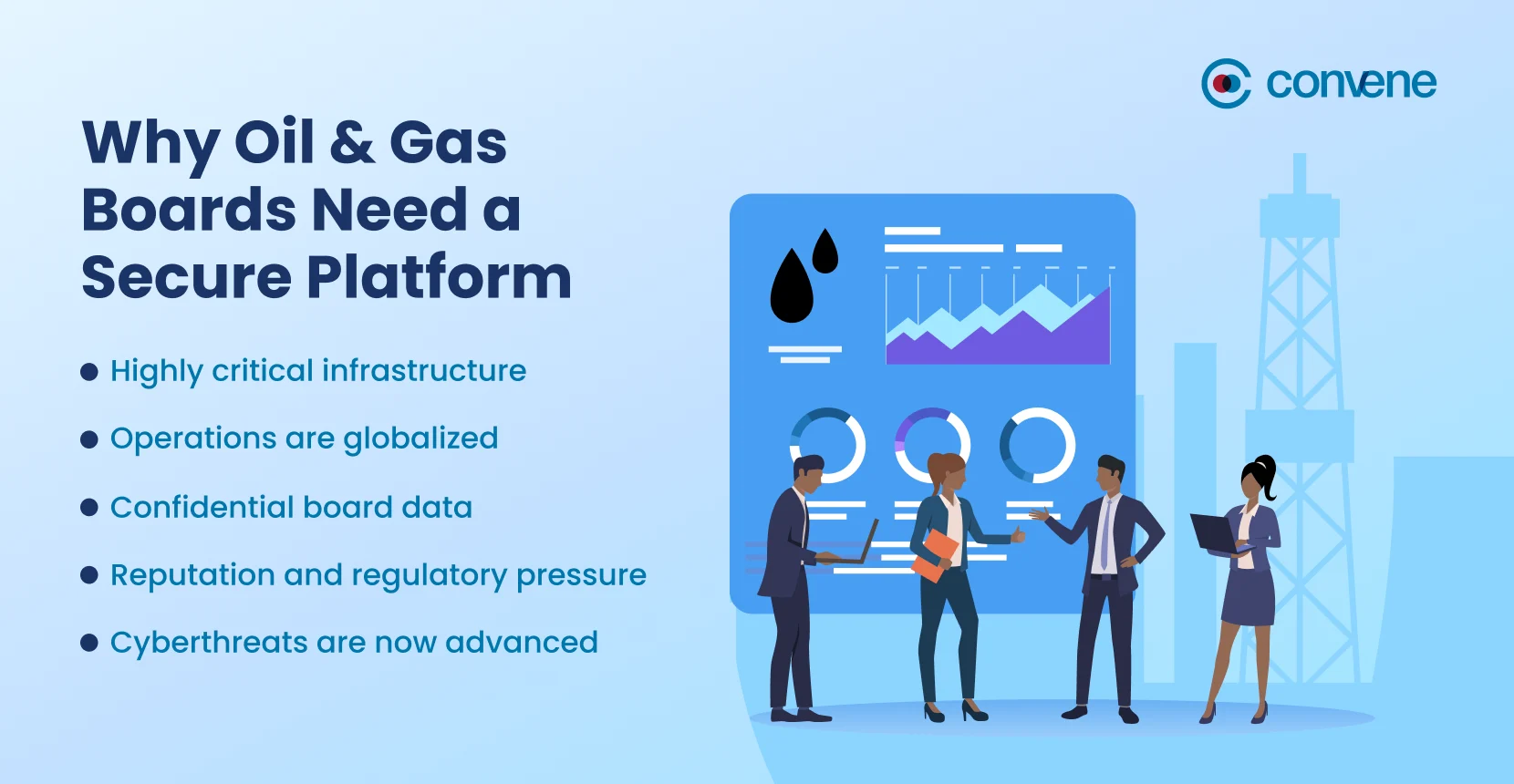
Cybersecurity in the oil and gas industry is no longer just a technical problem for IT teams to solve. It’s a board-level concern that demands active oversight.
The environment in which these companies operate is so complex and high-stakes that even a single vulnerability can lead to massive consequences.
Highly critical infrastructure
Oil and gas companies are often considered part of a nation’s critical infrastructure. This alone puts them in the crosshairs of attackers. A breach can disrupt energy supply chains and even impact national security. That makes energy companies some of the most attractive and high-profile targets for cyberattacks.
Operations are globalized
Boards and executives in this sector are rarely centralized. With teams and decision-makers spread across countries and time zones, keeping communication both seamless and secure is a major challenge. Every unsecured channel, whether it’s an email or a file transfer, becomes a potential entry point for attackers.
Confidential board data
Few industries handle data as sensitive and financially valuable as oil and gas. Exploration results, production forecasts, M&A discussions, and financial planning documents are treasure troves for cybercriminals.
Reputation and regulatory pressure
Beyond the immediate financial and operational damage, the reputational fallout from a cyber incident can be devastating. Investors lose confidence, and stakeholders question governance standards. Add to that the wave of regulatory scrutiny that follows, right from fines, investigations, lawsuits, and it’s clear why boards can’t afford to treat security as an afterthought.
Cyberthreats are now advanced
State-backed actors, organized crime groups, and hacktivists see enormous value in targeting energy companies. Attacks are no longer about basic phishing or malware, they involve advanced persistent threats, ransomware campaigns, and coordinated efforts designed to exploit the sector’s global, interconnected nature.
In this environment, boards that continue relying on unsecured board communication channels or outdated governance tools are leaving themselves dangerously exposed.
To protect their companies, stakeholders, and even the stability of the markets they serve, oil and gas boards must lead the charge in adopting secure, purpose-built governance technology.
How Board Portals Strengthen Governance and Cybersecurity for Oil & Gas Companies
A secure board portal steps in as both a shield and an enabler: it protects sensitive information while making governance simpler and more effective.
Here’s how:
1. Keeping sensitive information safe
Recent industry data reveals a sobering reality: 94% of the world’s top 400 oil and gas companies have suffered at least one data breach, with more than 50% experiencing breaches within just 30 days in 2025.
Board materials in the oil and gas sector represent some of the most valuable intellectual property on earth. These documents contain exploration data worth billions, seismic studies that took years to compile, production forecasts that can move markets, merger and acquisition strategies that could reshape entire regions, and increasingly critical ESG disclosures that determine regulatory compliance and investor confidence.
The vulnerability of this information became starkly apparent in recent ransomware campaigns targeting the sector. Ransomware attacks against oil and gas firms have surged dramatically, with the volume of stolen data increasing by 92% from April 2024 to April 2025.
Traditional communication channels create multiple points of failure. When board materials travel through email, they leave digital footprints across multiple servers, often stored indefinitely in cloud systems with varying security standards. The average energy company receives a cybersecurity score of D or F, with only 10% achieving an A grade, indicating systemic vulnerabilities that make traditional file sharing extraordinarily risky.
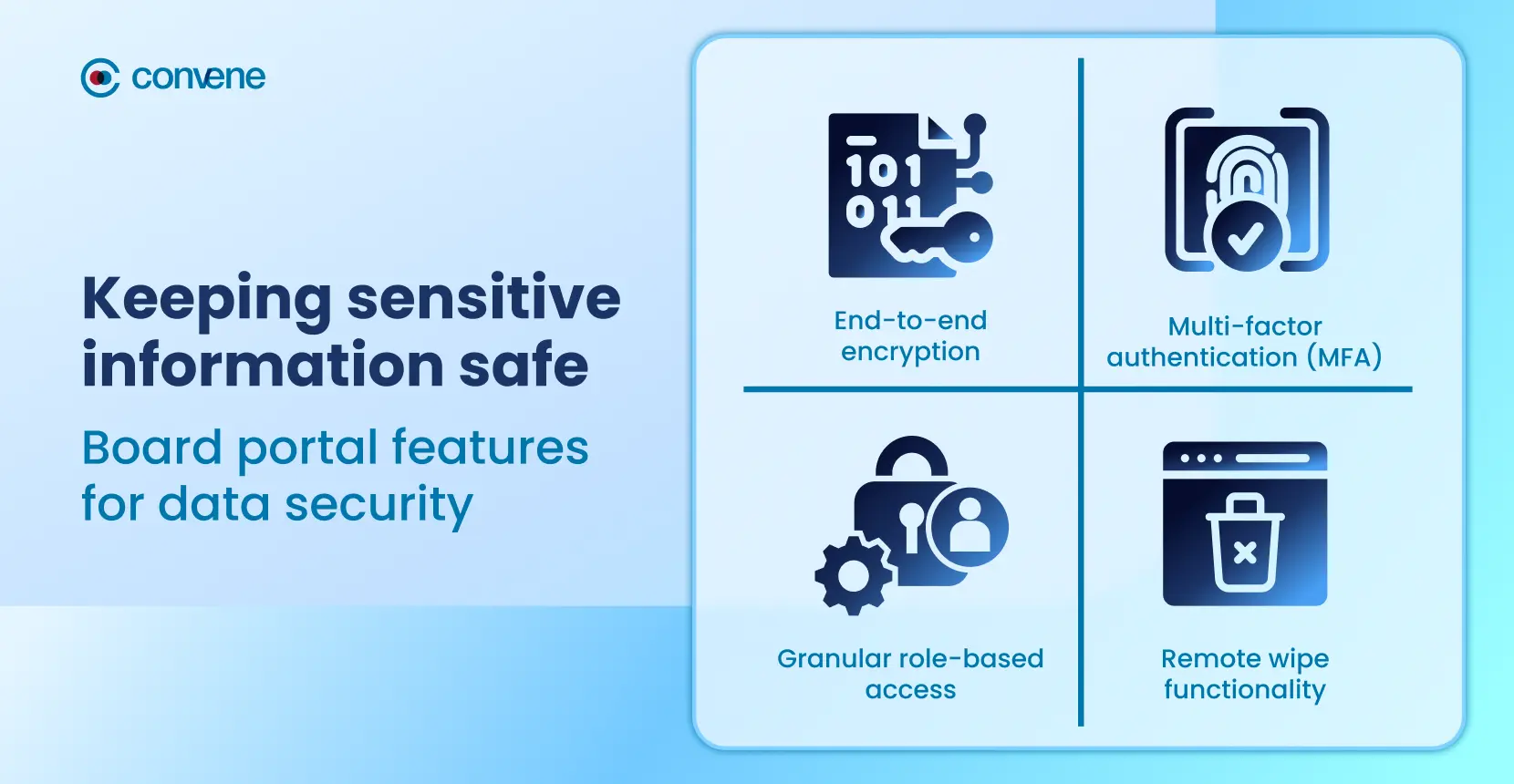
Board portal features for data security
End-to-end encryption
Documents remain unreadable even if intercepted during transmission or storage. Every document, every annotation, every message is encrypted using military-grade protocols that would take centuries to crack with current technology.
Multi-factor authentication (MFA)
This creates multiple verification checkpoints that make credential theft ineffective. Even if a director’s password is compromised through phishing or social engineering, the attacker cannot access board materials without also compromising the director’s physical device or biometric data.
Granular role-based access
Independent directors might see financial projections and strategic plans, while technical advisors access operational data and regulatory compliance reports. Executive sessions can be completely segregated, ensuring that even within the board, information flows only to appropriate parties.
Remote wipe functionality
When a device is lost, stolen, or an employee leaves the organization, administrators can instantly revoke access and remove all downloaded materials from the device. This capability proved essential during recent industry upheavals, where personnel changes occurred rapidly amid market volatility.
2. Making global collaboration secure
Energy boards span continents, with directors operating from Houston’s energy corridor, London’s financial district, Dubai’s business centers, Singapore’s trading hubs, and emerging markets across Africa, Latin America, and Asia. This geographical dispersion, while strategically necessary, creates multiple attack vectors that cybercriminals actively exploit.
These attacks specifically target the distributed nature of energy governance, knowing that directors operating across multiple time zones and jurisdictions are more likely to fall victim to social engineering. Video conferencing platforms too, unless specifically hardened for enterprise security, can be infiltrated through various attack vectors.
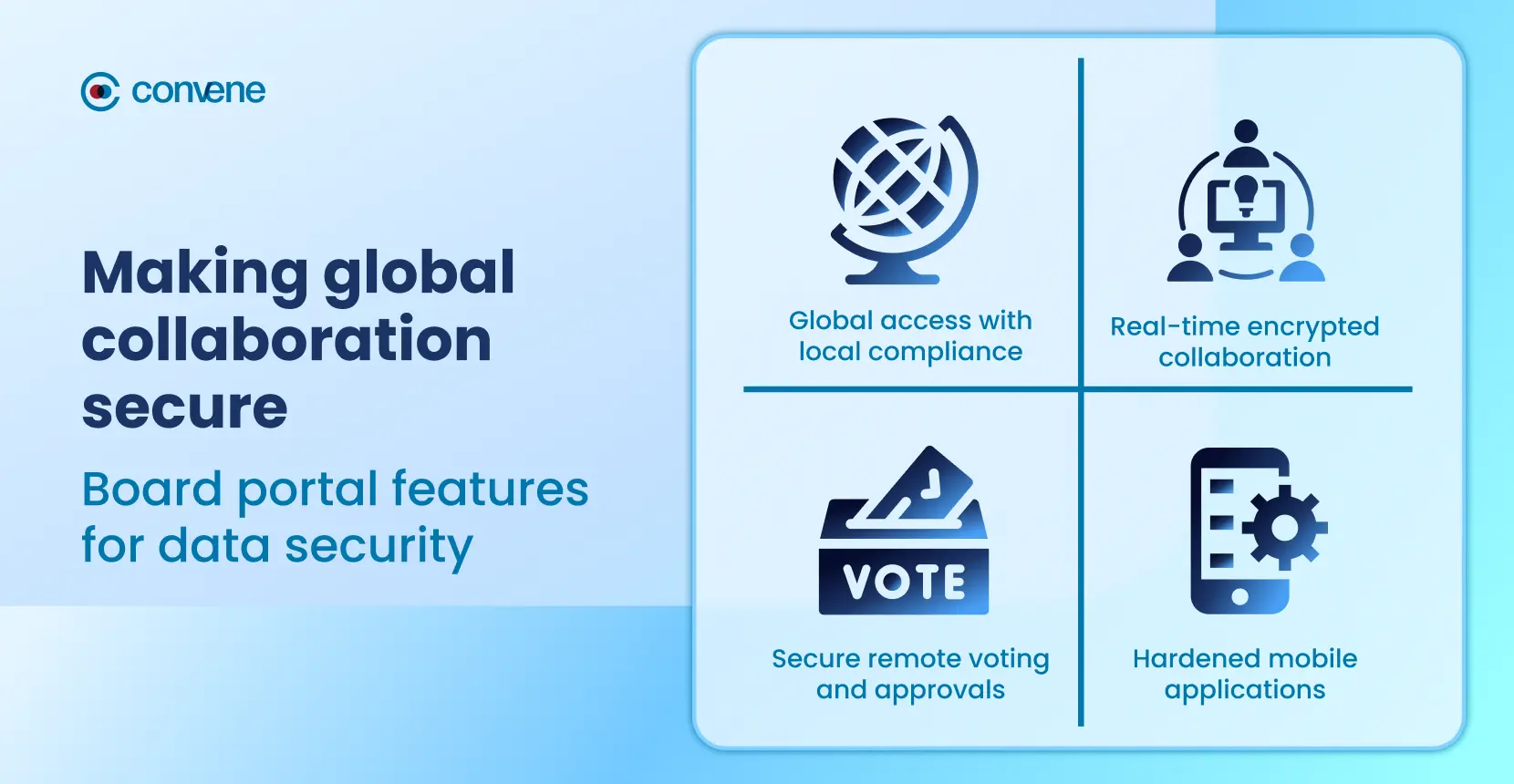
Board portal features for data security
Global access with local compliance
Ensures that directors can securely access board materials regardless of their location, while maintaining compliance with local data protection regulations. Whether a director is reviewing materials from GDPR-regulated Europe, privacy-conscious Canada, or emerging market jurisdictions with evolving cyber laws, the portal maintains appropriate security standards and audit trails.
Real-time encrypted collaboration
Allows directors to participate in discussions, annotate documents, and provide input without creating insecure communication trails.
Secure remote voting and approvals
Eliminate the need for insecure PDF signatures or email-based confirmations. Directors can cast votes on critical matters, approve emergency expenditures, and authorize strategic decisions through encrypted channels that create legally valid records.
Hardened mobile applications
Ensure that directors can participate in governance activities from their personal devices without compromising security. These applications maintain encryption even when operating on potentially insecure networks, such as hotel Wi-Fi, airport connections, or international roaming arrangements.
The mobile security component becomes particularly critical given the travel-intensive nature of energy governance. Hardened mobile applications create secure enclaves within these devices, ensuring that board communications remain protected even in hostile networking environments.
3. Building trust through transparency
Energy companies operate under intense scrutiny from regulators, environmental groups, investors focused on ESG criteria, and communities directly affected by operations.
Paper-based meeting minutes may not capture the nuance of complex discussions. Email trails can be incomplete or selectively preserved. Document version control becomes problematic when multiple stakeholders contribute to evolving strategies.
Most critically, traditional systems often cannot demonstrate that all directors received identical information simultaneously, creating potential grounds for legal challenges.
The cybersecurity challenges facing the sector compound these transparency requirements. With 91% of oil and gas organizations having SSL/TLS configuration issues and 48% suffering from email security weaknesses, traditional governance systems cannot provide the audit trail integrity that modern regulatory environments demand.
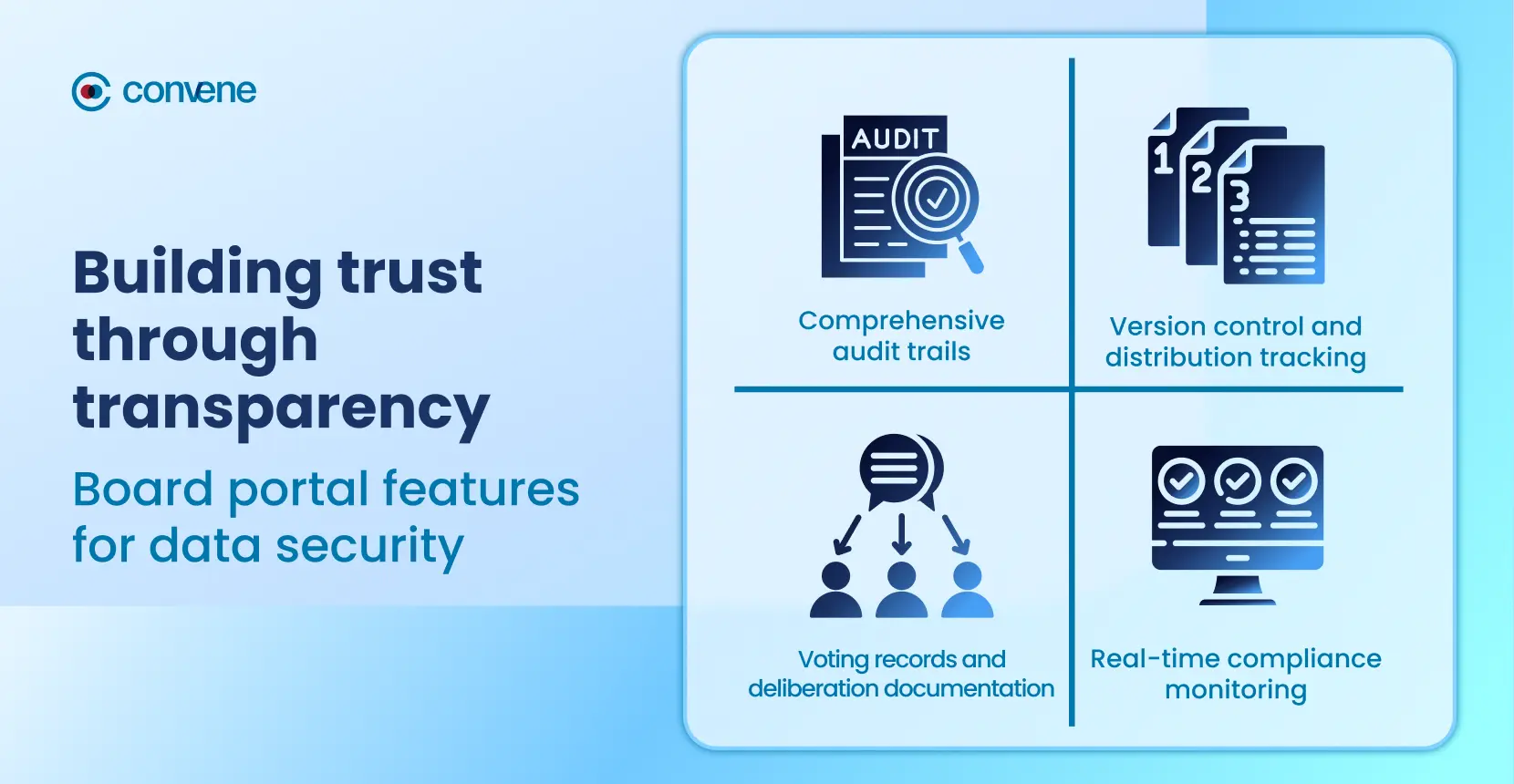
Board portal features for data security
Comprehensive audit trails
When a director accesses a document discussing potential drilling operations, the system records not just the access time, but also how long the document was viewed, which sections received particular attention, whether the director downloaded or printed materials, and any annotations or comments added.
This level of detail becomes invaluable during regulatory investigations or shareholder disputes.
Version control and distribution tracking
When the board reviews updated environmental impact assessments, the system automatically tracks which directors received which versions, and whether all members acknowledged receipt before critical votes.
Voting records and deliberation documentation
Create permanent, tamper-evident records of board decision-making. Unlike traditional voting systems that may rely on voice votes or show-of-hands, secure portals create cryptographically signed records that can withstand legal scrutiny.
When boards make controversial decisions about production increases or major capital investments, these detailed records provide essential protection during subsequent litigation or regulatory review.
Real-time compliance monitoring
Energy companies often operate under different governance standards in various markets, and board portals can automatically flag when local compliance requirements affect board processes or information sharing.
When board members can see exactly who has reviewed critical information, when input was provided, and how decisions evolved, it eliminates the ambiguity that often undermines board effectiveness. Directors spending limited time together can focus on strategic decisions rather than administrative clarifications about who knew what when.
4. Protecting against everyday threats
Energy companies rank among the top five industries by average cost of data breaches, often exceeding $4 million per incident, but the true impact extends far beyond immediate financial losses, according to the same analysis above.
When cybercriminals target energy boards, they’re potentially disrupting global energy markets, compromising national security interests, and affecting millions of consumers who depend on reliable energy supplies.
AI-enhanced attacks are particularly dangerous for energy boards because directors often make time-sensitive decisions based on seemingly urgent communications from colleagues or advisors.
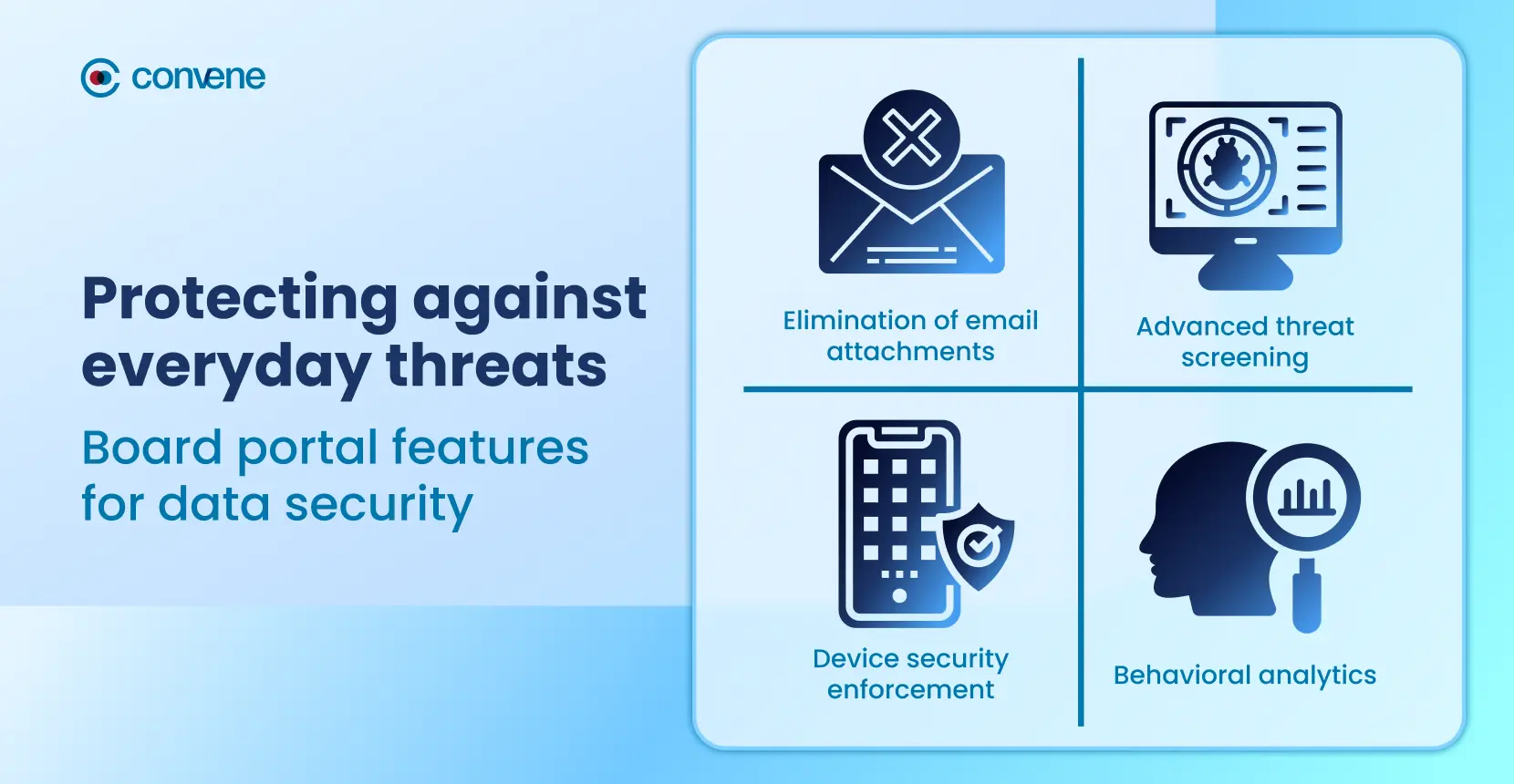
Board portal features for data security
Elimination of email attachments
Removes the most common malware entry point. Traditional board communications often involve large attachments, geological surveys, financial models, regulatory filings, that provide perfect camouflage for malicious code.
By centralizing all board materials within encrypted portals, these attack vectors are completely eliminated. Directors access materials through secure interfaces that cannot be compromised through attachment-based attacks.
Advanced threat screening
Analyzes all content before it reaches directors, using machine learning algorithms trained specifically on energy sector threats. When external advisors upload materials to the portal, comprehensive scanning ensures that malicious content is identified and quarantined before it can affect board operations.
Device security enforcement
Ensures that director devices meet minimum security standards before accessing board materials. This includes requirements for updated operating systems, active malware protection, screen locks, and encryption for locally stored data. When directors attempt to access materials from potentially compromised devices, the system can block access or require additional authentication steps.
Behavioral analytics
Monitor access patterns to identify potential security breaches before they cause damage. If a director’s account suddenly begins accessing unusual materials, downloading large volumes of data, or exhibiting other suspicious patterns, the system can automatically flag these activities for investigation.
This capability becomes particularly valuable when dealing with sophisticated threats that may compromise credentials without immediately triggering obvious warning signs.
Essential Board Portal Features for Oil & Gas Companies
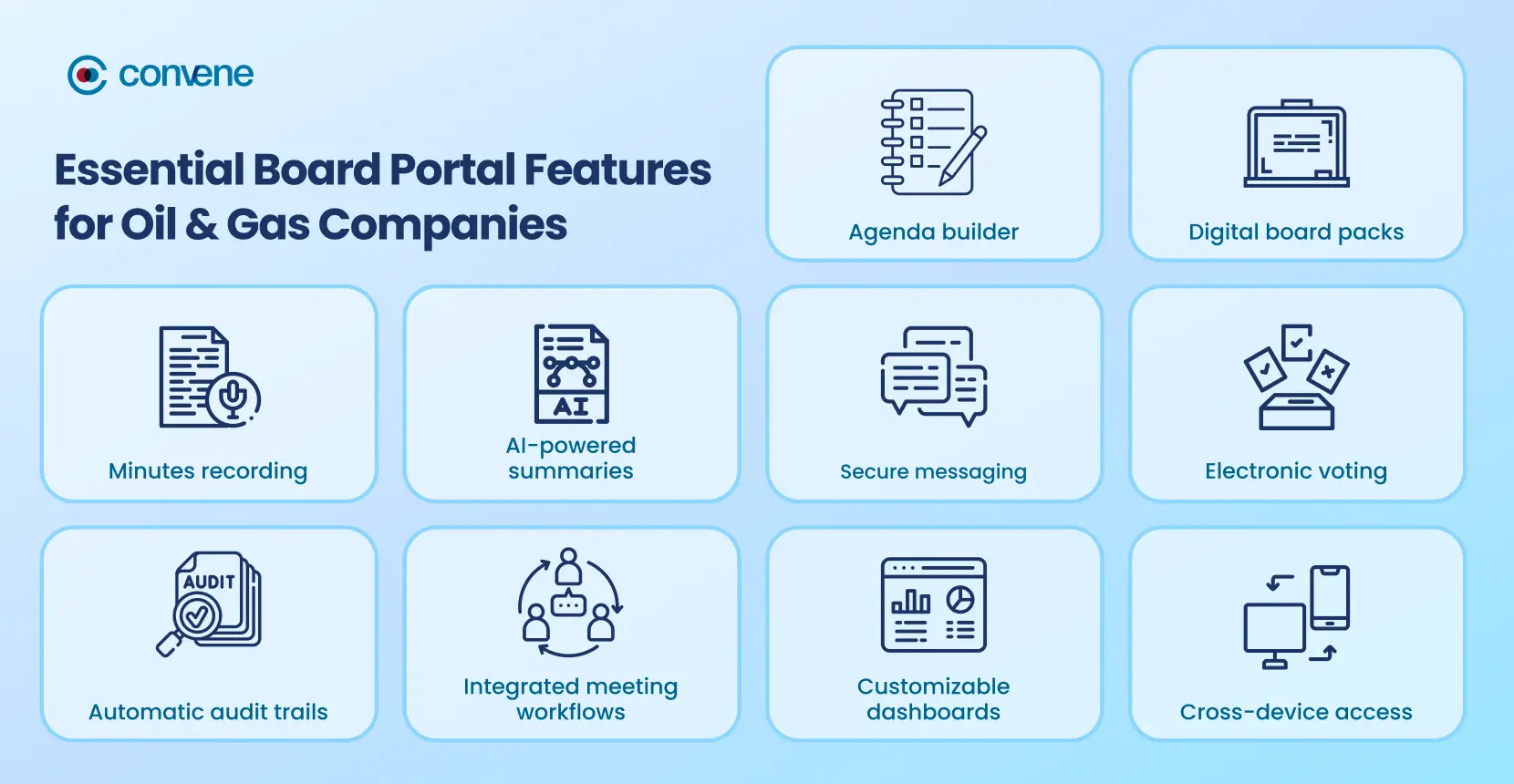
- Agenda builder with real-time updates and distribution
- Digital board packs with search, annotation, and offline access
- Minutes recording with action item tracking and reminders
- AI-powered summaries and risk insights from lengthy reports
- Secure messaging, annotations, and collaboration within the portal
- Electronic voting, e-signatures, and tamper-proof approvals
- Automatic audit trails and compliance checklists
- Integrated pre-meeting, in-meeting, and post-meeting workflows
- Customizable dashboards for analytics, ESG, and reporting
- Cross-device access with mobile and offline functionality
How does Convene board portal strengthen the governance of Oil and Gas boards?
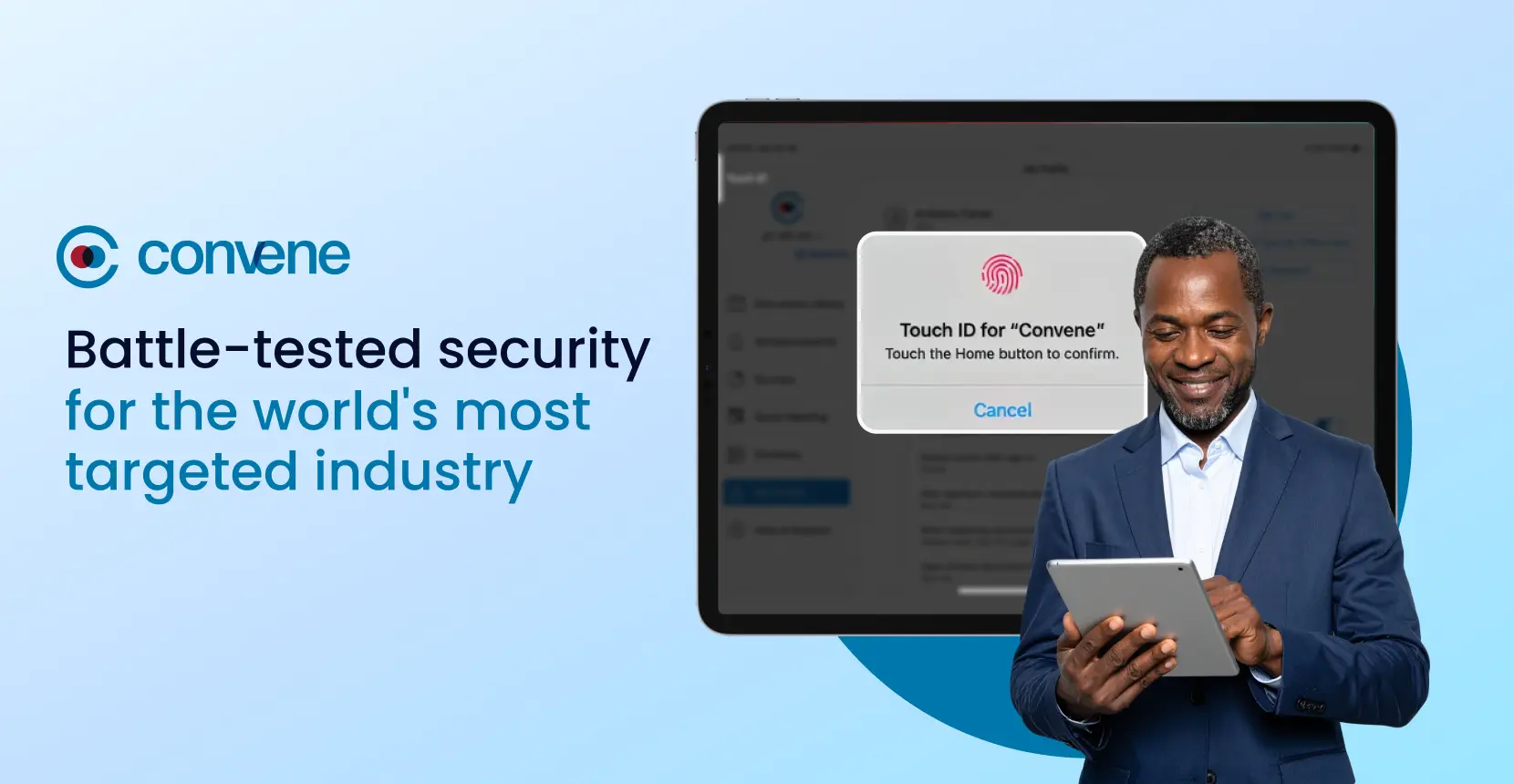
Battle-tested security for the world’s most targeted industry
While 94% of major oil and gas companies have suffered data breaches, Convene’s enterprise-grade encryption and multi-level authentication have protected Fortune 500 energy companies for over a decade.
With CMMI Level 5 certification and ISO 27001 compliance, Convene delivers the military-grade security that energy boards demand when handling exploration data worth billions.
Crisis management that actually works when it matters
When the ONGC well blowout required five days of continuous crisis management, energy boards needed instant, secure collaboration across continents.
Convene’s real-time synchronized page viewing and virtual laser pointer enable immediate decision-making during operational emergencies, while automatic notifications ensure no director misses critical updates.
Regulatory compliance that passes every audit
Convene’s comprehensive audit trails and automated compliance workflows create bulletproof documentation. When energy companies face intense ESG scrutiny and governance investigations,
Convene’s tamper-evident records and detailed activity tracking provide the transparency that satisfies regulators and protects directors.
Industry-specific expertise that understands energy governance
Convene actively recruits business development managers with mandatory oil and gas industry experience. This isn’t generic board software adapted for energy, it’s a purpose-built solution that recognizes the unique security, compliance, and operational demands facing oil and gas boards today.
Find out how a secure board portal can provide you with the best board management software. Request a demo with the Convene team today and explore the board portal fully for your organization.
Jean is a Content Marketing Specialist at Convene, with over four years of experience driving brand authority and influence growth through effective B2B content strategies. Eager to deliver impactful results, Jean is a data-driven marketer who combines creativity with analytics. In her downtime, Jean relaxes by watching documentaries and mystery thrillers.










